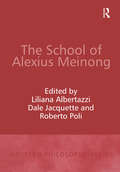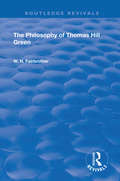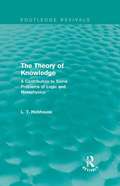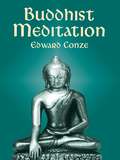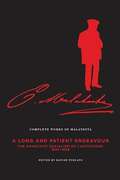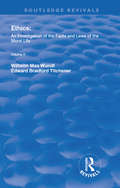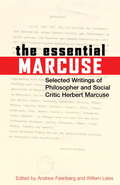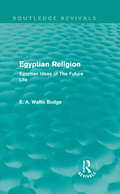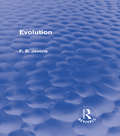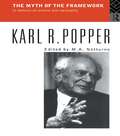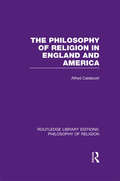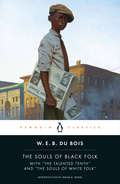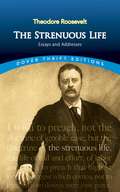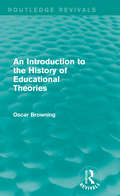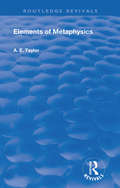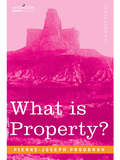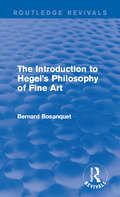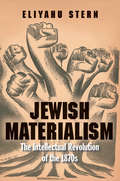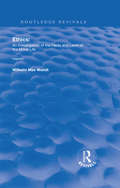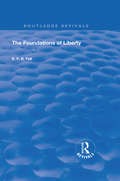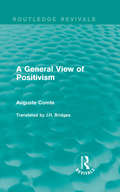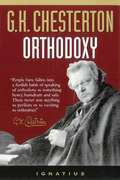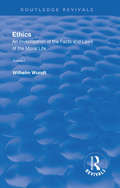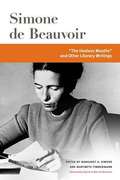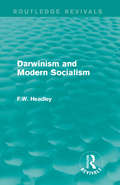- Table View
- List View
The School of Alexius Meinong (Western Philosophy Series)
by Liliana Albertazzi Dale JacquetteThis book presents an historical and conceptual reconstruction of the theories developed by Meinong and a group of philosophers and experimental psychologists in Graz at the turn of the 19th century. Adhering closely to original texts, the contributors explore Meinong's roots in the school of Brentano, complex theories such as the theory of intentional reference and direct reference, and ways of developing philosophy which are closely bound up with the sciences, particularly psychology. Providing a faithful reconstruction of both Meinong's contributions to science and the school that arose from his thought, this book shows how the theories of the Graz school raise the possibility of engaging in the scientific metaphysics and ontology that for so long have been considered off limits.
The Philosophy Of Thomas Hill Green (Routledge Revivals)
by W.H. FairbrotherPublished in 1900, this is a collection of one of Britain’s most prolific metaphysic thinkers of the 19th century. Fairbrother introduces Thomas Hill Greens moral philosophy on themes such as politics and virtue whilst relating it back to the philosophy of ancient Greece that first inspired Green.
The Theory of Knowledge: A Contribution to Some Problems of Logic and Metaphysics (Routledge Revivals)
by L. T. HobhouseL. T. Hobhouse (1864-1929) was fundamental to the New Liberal movement of the late nineteenth and early twentieth century. He authored many important works in the fields of philosophy, economics and social liberalism. First published in 1896, The Theory of Knowledge considers the content and validity of knowledge, and the conditions on which our understanding of knowledge is based. It is a rich and important classic, which remains of value to students and academics with an interest in sociology, anthropology and the philosophy of logic.
Buddhist Meditation (Routledge Library Editions: Buddhism Ser.)
by Edward ConzeAs prayer is to the Christian life, so meditation is the very heart of Buddhist life. This introduction explains the meaning and purpose of meditation. Its series of devotional exercises include instructions on maintaining mental and physical awareness during meditation, with advice on postures, breathing, repudiation of the sensory world, and more.
The Complete Works of Malatesta V.III: The Anarchist Socialism of L'Agitazione, 189798
by Davide Turcato Errico Malatesta Paul SharkeyThe first in AK Press's ten-volume Complete Works of Malatesta. This one (volume three chronologically) focuses on two very important years in Errico Malatesta's life, when he returned to Italy to edit L'Agitazione. This volume begins the series with a bang.
Ethics: An Investigation of the Facts and Laws of the Moral Life, Volume II (Routledge Revivals)
by Wilhelm Max WundtOriginally published in 1897, this volume is a translation of the second book of Professor Wundt's Ethik, comprising pages 270-432 of the second German edition, and forms a concise history of ethics. Ethik was originally published in revised form in 1892. It has been the author's object in the work to investigate the problems of ethics in the light of an examination of the facts of moral life, including chapters on ancient ethics, Christian ethics and modern ethics.
The Essential Marcuse
by William Leiss Andrew Feenberg Herbert MarcuseThe Essential Marcuse provides an overview of Herbert Marcuse's political and philosophical writing over four decades, with excerpts from his major books as well as essays from various academic journals. The most influential radical philosopher of the 1960s, Marcuse's writings are noteworthy for their uncompromising opposition to both capitalism and communism. His words are as relevant to today's society as they were at the time they were written.From the Trade Paperback edition.
Egyptian Religion: Egyptian Ideas of The Future Life (Routledge Revivals)
by E.A. Wallis BudgeSir E. A. Wallis Budge (1857-1934) was Keeper of the British Museum’s department of oriental antiquities from 1894 until his retirement in 1924. Carrying out many missions to Egypt in search of ancient objects, Budge was hugely successful in collecting papyri, statues and other artefacts for the trustees of the British Museum: numbering into the thousands and of great cultural and historical significance. Budge published well over 100 monographs, which shaped the development of future scholarship and are still of great academic value today, dealing with subjects such as Egyptian religion, history and literature. First published in 1899 as part of the Egypt and Chaldaea series, Egyptian Religion explores the principal ideas and beliefs held by the ancient Egyptians with regard to the doctrine of the resurrection and the future life. Although no systematic account dealing solely with this doctrine has been discovered, the Book of the Dead and various other religious texts from which this work is derived reflect ancient Egyptian beliefs, ideals and superstitions. Wallis Budge explores the Gods of the Egyptians and the themes of resurrection and immorality in a classic work, of great significance to students and scholars with an interest in ancient Egyptian and Middle Eastern history and religion.
Evolution (Routledge Revivals)
by F. B. JevonsFirst published in 1900, this philosophical essay on Evolution questions how the acceptance of Evolution as scientific should influence the thoughts and actions of humankind from the perspective of morality and moral conduct. In his discussion, Frank B. Jevons deals with such subjects as pessimism and optimism towards evolutionary theory, the laws of motion and matter, and the importance of scientific evidence.
The Myth of the Framework: In Defence of Science and Rationality
by Karl PopperIn a career spanning sixty years, Sir Karl Popper has made some of the most important contributions to the twentieth century discussion of science and rationality. The Myth of the Framework is a new collection of some of Popper's most important material on this subject.Sir Karl discusses such issues as the aims of science, the role that it plays in our civilization, the moral responsibility of the scientist, the structure of history, and the perennial choice between reason and revolution. In doing so, he attacks intellectual fashions (like positivism) that exagerrate what science and rationality have done, as well as intellectual fashions (like relativism) that denigrate what science and rationality can do. Scientific knowledge, according to Popper, is one of the most rational and creative of human achievements, but it is also inherently fallible and subject to revision.In place of intellectual fashions, Popper offers his own critical rationalism - a view that he regards both as a theory of knowlege and as an attitude towards human life, human morals and democracy.Published in cooperation with the Central European University.
The Philosophy of Religion in England and America (Routledge Library Editions: Philosophy of Religion)
by Alfred CaldecottA classic in the area, originally published in 1901, this book is a survey of the past work in the field of philosophy of religion, a conspectus of literature and comparison of methods and theologies from the Reformation to the start of the twentieth century. The Introduction part of the volume offers a classification system to explain the order of the detailed section of the book. Lesser-known theologians are covered as well as great thinkers, a deliberate choice on the part of the author. Within each chapter, types of theism are then broken down into sections on individual thinkers, or group of thinkers with a reference to their main works.
The Souls of Black Folk: With "The Talented Tenth" and "The Souls of White Folk"
by Donald B. Gibson W. E. Du Bois Monica E. ElbertDu Bois' 1903 collection of essays is a thoughtful, articulate exploration of the moral and intellectual issues surrounding the perception of blacks within American society.
The Strenuous Life: Essays and Addresses (Dover Thrift Editions Ser.)
by Theodore RooseveltPolitician, soldier, naturalist, and historian--a century after the peak of his multifaceted career, Theodore Roosevelt remains a towering symbol of American optimism and progress. This collection of speeches and commentaries from 1899 through 1901 embodies the Rough Rider's enduring ideals for attaining a robust political, social, and personal life.The twenty-sixth president of the United States, Theodore Roosevelt (1858-1919) served as Chief Executive from 1901 to 1909 and was awarded the Nobel Prize in 1906 for his mediation of the Russo-Japanese War. Roosevelt wrote thirty-five books and delivered numerous lectures on topics ranging from citizenship and success to duty and sportsmanship. His 1899 address to a Chicago audience, "The Strenuous Life," articulates his belief in the transformative powers that individuals can achieve by overcoming hardship. Along with the other speeches and essays in this collection, Roosevelt's work offers an inspiring vision of moral rectitude and stalwart leadership.
An Introduction to the History of Educational Theories (Routledge Revivals)
by Oscar BrowningAn Introduction to the History of Educational Theories, first published in 1881, offers a comprehensive overview of the most notable approaches to education throughout Western history, from Athens and Rome to the Victorian public school. Exploring not only the still famous theories of Plato and Aristotle, this work also touches on techniques in education which are either no longer prevalent – Roman Oratory, the Jesuits – or in some cases were never widely adopted or appreciated: John Milton, for example. This title will be of value to those intrigued by the potential of past attitudes for present-day application, as well as to those unconvinced by contemporary approaches.
Elements of Metaphysics (Routledge Revivals)
by A. E TaylorFirst published in 1903, Taylor endeavours to provide a detailed study of metaphysic as a discipline. Opening with a brief history of metaphysics, the book explores topics including the problem of the metaphysician, the metaphysical method, subdivisions of metaphysics, ontology, reality, cosmology, rational psychology, morality, ethics and religion.
What is Property?
by Pierre-Joseph ProudhonProudhon's most famous declaration that "property is theft" comes from this, his most famous work, published in French in 1840; the English translation dates from 1890. According to Proudhon, only that which is being used is real property. Land must be lived on or farmed to be property, and goods must have been made by one's own labor to be owned. These new definitions challenge the very basis of capitalist systems, and Proudhon used them as the foundation for his writings in support of anarchy. Activists, historians, and philosophers will find themselves pondering his arguments long after they have finished reading.
The Introduction to Hegel's Philosophy of Fine Art: Translated From The German With Notes And Prefatory Essay (classic Reprint) (Routledge Revivals)
by Bernard BosanquetOriginally published in 1905, Bosanquet’s translation of Hegel’s Philosophy of Fine Art brings Hegel’s commentary and analysis of what constitutes beauty and fine art to an English audience as well as presenting his own viewpoints on the work and what is at the heart of true philosophical theory. This title will be of interest to students of philosophy and art.
Jewish Materialism: The Intellectual Revolution of the 1870s
by Eliyahu SternA paradigm-shifting account of the modern Jewish experience, from one of the most creative young historians of his generationTo understand the organizing framework of modern Judaism, Eliyahu Stern believes that we should look deeper and farther than the Holocaust, the establishment of the State of Israel, and the influence and affluence of American Jewry. Against the revolutionary backdrop of mid-nineteenth-century Europe, Stern unearths the path that led a group of rabbis, scientists, communal leaders, and political upstarts to reconstruct the core tenets of Judaism and join the vanguard of twentieth-century revolutionary politics. In the face of dire poverty and rampant anti-Semitism, they mobilized Judaism for projects directed at ensuring the fair and equal distribution of resources in society. Their program drew as much from the universalism of Karl Marx and Charles Darwin as from the messianism and utopianism of biblical and Kabbalistic works. Once described as a religion consisting of rituals, reason, and rabbinics, Judaism was now also rooted in land, labor, and bodies. Exhaustively researched, this original, revisionist account challenges our standard narratives of nationalism, secularization, and de-Judaization.
Ethics: An Investigation of the Facts and Laws of the Moral Life (Routledge Revivals)
by Wilhelm Max WendtOriginally published in 1908, the text upon which this translation is based is that of the first 269 pages of Professor Wundt's Ethik, as published in revised form in 1892. It has been the author's object in the work to investigate the problems of ethics in the light of an examination of the facts of moral life, including chapters on language and ethical ideas, religion and morality, and custom and the moral life.
The Foundations of Liberty (Routledge Revivals)
by E. F. FellOriginally published in 1908, this book aims at setting forth liberty, personal and national - not as a mere utility as is usually the case - but as an a priori moral necessity, the sine qua non of all true civilisation.
A General View of Positivism: Large Print (Routledge Revivals)
by Auguste ComteIn Comte’s original work on positivism, he attempted to outline a general perception of positivism, how it can be applied to society and how society would work should positivism be applied. J.H. Bridges’ translation, originally published in 1865, this version first published in 1908, manages to simplify and clarify Comte’s views of positivism and how it is related to the thoughts, feelings and actions of humankind as well as how positivism can be applied to philosophy, politics, industry, poetry, the family and the future. This title will be of interest to students of sociology and philosophy.
Orthodoxy
by G. K. ChestertonOrthodoxy (1908) is a book by G. K. Chesterton that has become a classic of Christian apologetics. Chesterton considered this book a companion to his other work, Heretics. Chesterton presents an original view of Christian religion. He sees it as the answer to natural human needs, the "answer to a riddle" in his own words, and not simply as an arbitrary truth received from somewhere outside the boundaries of human experience.
Revival: Volume I: Introduction: The Facts of Moral Life (Routledge Revivals)
by Wilhelm WundtIt has been my object in the present work to investigate the problems of ethics in the light of an examination of the facts of moral life. One reason for this procedure is my desire to conduct the reader by the same path that I myself have followed in approaching ethical questions.
"The Useless Mouths" and Other Literary Writings
by Sylvie Le Beauvoir Margaret A. Simons Marybeth Timmermann Simone De Beauvoir"The Useless Mouths" and Other Literary Writings brings to English-language readers literary writings--several previously unknown--by Simone de Beauvoir. Culled from sources including various American university collections, the works span decades of Beauvoir's career. Ranging from dramatic works and literary theory to radio broadcasts, they collectively reveal fresh insights into Beauvoir's writing process, personal life, and the honing of her philosophy. The volume begins with a new translation of the 1945 play "The Useless Mouths," written in Paris during the Nazi occupation. Other pieces were discovered after Beauvoir's death in 1986, such as the 1965 short novel Misunderstanding in Moscow, involving an elderly French couple who confront their fears of aging. Two additional previously unknown texts include the fragmentary "Notes for a Novel," which contains the seed of what she later would call "the problem of the Other," and a lecture on postwar French theater titled "Existential Theater." The collection notably includes the eagerly awaited translation of Beauvoir's contribution to a 1965 debate among Jean-Paul Sartre and other French writers and intellectuals, "What Can Literature Do?" Prefaces to well-known works such as Bluebeard and Other Fairy Tales,La Bâtarde, and James Joyce in Paris: His Final Years are also available in English for the first time, alongside essays and other short articles. A landmark contribution to Beauvoir studies and French literary studies, the volume includes informative and engaging introductory essays by prominent and rising scholars. Contributors are Meryl Altman, Elizabeth Fallaize, Alison S. Fell, Sarah Gendron, Dennis A. Gilbert, Laura Hengehold, Eleanore Holveck, Terry Keefe, J. Debbie Mann, Frederick M. Morrison, Catherine Naji, Justine Sarrot, Liz Stanley, Ursula Tidd, and Veronique Zaytzeff.
Darwinism and Modern Socialism (Routledge Revivals)
by F.W. HeadleyAn adamant fan of Darwin, F.W. Headley attempts to argue the difficulties of believing in Socialism and Darwinism simultaneously and highlights issues which could prevent Socialism from being put into practice. Originally published in 1909, this study uses examples of communities in countries such as England and India to illustrate Headley’s key belief that societies only function well if they do not interfere with the fight for existence and natural selection. This title will be of interest to students of Philosophy, Sociology and Anthropology.
